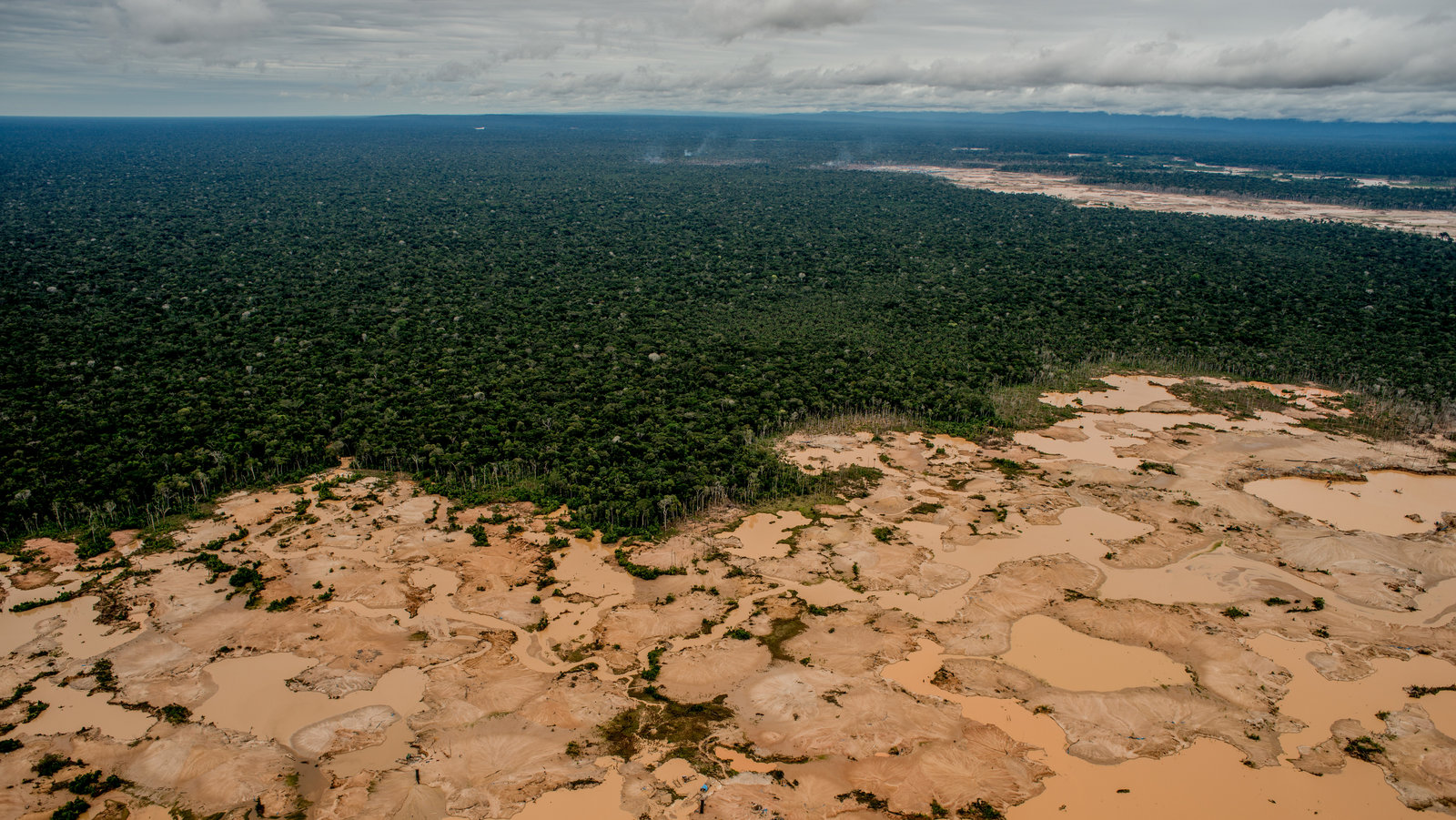Amazonie
ESG
Mining
In the three years since Jair Bolsonaro ascended to power, deforestation of the Amazon rainforest, violence against indigenous populations and illegal mining activities have reached an all-time high.
The far-right president has set a precedent, and now more than ever, the indigenous population and environment are at risk. The climate sceptic head of state is pushing for five bills with cataclysmic impacts on the environment. The legalization of mining on indigenous reservations, including territories in the rainforest such as the protected Javari Valley, is among these proposed bills. Additionally, these bills would cause an increased laxity in mining regulations, further incentivising illegal mining activities, known as garimpo. garimpo.
Protesters in Brazil have long lamented the president’s increasing avarice. In 2020, his lack of regard for the disastrous forest fires landed him in the hot seat. Despite the international backlash, to this day Bolsonaro continues to bulldoze forward. Indigenous populations and city-dwellers alike have come together to protest the land-grabbing and destructive plans set in motion. Known as the “death combo” amongst environmental activists, the five bills will have dire environmental and social consequences. Three of these are currently being presented to the senate and are awaiting a conclusive vote.
Bolsonaro has been pushing his agenda forward by using the current geopolitical climate as a ploy in his favour. By weaponizing the urgency of the Ukraine war and the resulting fertilizer shortages, Bolsonaro is pushing forward an intensification of mining, especially for potassium, a key fertilizer ingredient. Unsurprisingly, the president’s claim is unfounded, as the presence of potassium is rather scarce compared to other profitable minerals found in the region.
These bills threaten the complex ecosystem of the Amazon rainforest. The impacts of deforestation have already made themselves known. Destruction of habitats, loss of species, longer dry seasons, forest fires and lower air quality are but the tip of the iceberg, and if we continue at this pace, the rainforest will let way to savanna. Many are calling these bills “ecocide”. The death of the rainforest would set off a chain reaction with enough impetus that it could not be reversed, bringing down along with it any hope to achieve the Paris Agreement goals.
Not only an attack on the environment, but these bills also carry the promise of an attack on the indigenous populations of Amazonia. Under Bolsonaro, acts of violence towards indigenous populations have soared, in part due to the emboldened garimpeiros. In addition to physical violence, increased mining activities in indigenous territories would increase the risk of contact with povos isolados.Contact with these isolated indigenous tribes could result in the loss of entire cultures and tribes caused by the introduction of modern common diseases such as influenza. The deterioration of indigenous territories has already had disastrous effects on local tribes. As stated in The Guardian by Jaime Siqueira head of the Indigenous Work Centre (CTI) : “Not since the dictatorship have we lived through such a tough moment" .
In a surprising turn of events, the rainforest’s last line of defence could very well be the institutions that have contributed to its destruction in the past. The Instituto Brasileiro de Mineração,also known as IBRAM, has vehemently opposed these advances. The group, which includes mining giants such as Rio Tinto, Alcoa and Arkema, has openly lobbied against the president’s bills, deeming them “inappropriate”.
There are multiple reasons explaining IBRAM’s zealous approach. It would be unfair to say that the mining industry hasn’t changed, it is taking great strides towards progress. With ESG at the heart of its decision; mining giants are now: publishing internal data, complying with international sustainability standards, establishing improved work conditions and striving for positive innovation. The industry is constantly evolving and has grown conscientious of its impact. It would be injudicious, however, to think that the mining conglomerate has no interest in the potential the rainforest possesses. This does not automatically contradict the desire to proceed with caution and care and protect local indigenous populations.
Whether these actions are motivated by goodwill, we will never know, but a win remains a win. In this case, ESG compliance could help steer the compass in a positive direction, protecting both local populations and the global environment.
Credits photo @amazonaid.org
Protesters in Brazil have long lamented the president’s increasing avarice. In 2020, his lack of regard for the disastrous forest fires landed him in the hot seat. Despite the international backlash, to this day Bolsonaro continues to bulldoze forward. Indigenous populations and city-dwellers alike have come together to protest the land-grabbing and destructive plans set in motion. Known as the “death combo” amongst environmental activists, the five bills will have dire environmental and social consequences. Three of these are currently being presented to the senate and are awaiting a conclusive vote.
Bolsonaro has been pushing his agenda forward by using the current geopolitical climate as a ploy in his favour. By weaponizing the urgency of the Ukraine war and the resulting fertilizer shortages, Bolsonaro is pushing forward an intensification of mining, especially for potassium, a key fertilizer ingredient. Unsurprisingly, the president’s claim is unfounded, as the presence of potassium is rather scarce compared to other profitable minerals found in the region.
These bills threaten the complex ecosystem of the Amazon rainforest. The impacts of deforestation have already made themselves known. Destruction of habitats, loss of species, longer dry seasons, forest fires and lower air quality are but the tip of the iceberg, and if we continue at this pace, the rainforest will let way to savanna. Many are calling these bills “ecocide”. The death of the rainforest would set off a chain reaction with enough impetus that it could not be reversed, bringing down along with it any hope to achieve the Paris Agreement goals.
Not only an attack on the environment, but these bills also carry the promise of an attack on the indigenous populations of Amazonia. Under Bolsonaro, acts of violence towards indigenous populations have soared, in part due to the emboldened garimpeiros. In addition to physical violence, increased mining activities in indigenous territories would increase the risk of contact with povos isolados.Contact with these isolated indigenous tribes could result in the loss of entire cultures and tribes caused by the introduction of modern common diseases such as influenza. The deterioration of indigenous territories has already had disastrous effects on local tribes. As stated in The Guardian by Jaime Siqueira head of the Indigenous Work Centre (CTI) : “Not since the dictatorship have we lived through such a tough moment" .
In a surprising turn of events, the rainforest’s last line of defence could very well be the institutions that have contributed to its destruction in the past. The Instituto Brasileiro de Mineração,also known as IBRAM, has vehemently opposed these advances. The group, which includes mining giants such as Rio Tinto, Alcoa and Arkema, has openly lobbied against the president’s bills, deeming them “inappropriate”.
There are multiple reasons explaining IBRAM’s zealous approach. It would be unfair to say that the mining industry hasn’t changed, it is taking great strides towards progress. With ESG at the heart of its decision; mining giants are now: publishing internal data, complying with international sustainability standards, establishing improved work conditions and striving for positive innovation. The industry is constantly evolving and has grown conscientious of its impact. It would be injudicious, however, to think that the mining conglomerate has no interest in the potential the rainforest possesses. This does not automatically contradict the desire to proceed with caution and care and protect local indigenous populations.
Whether these actions are motivated by goodwill, we will never know, but a win remains a win. In this case, ESG compliance could help steer the compass in a positive direction, protecting both local populations and the global environment.
Credits photo @amazonaid.org



